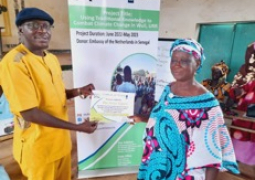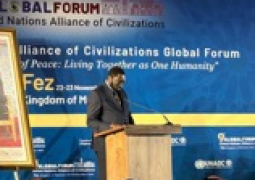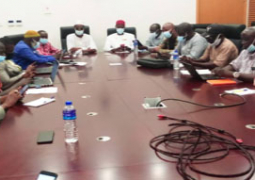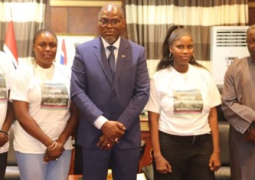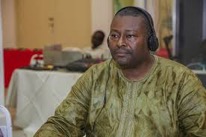
Joof was speaking as keynote speaker at the Social Sciences and Humanities Students' Association (SoSHSA) of the University of The Gambia- Weeklong activity 11th to 16th November 2024 involving hundreds of students from across all the eight (8) units in the Division of Humanities and
Social Sciences at Farababantang Campus.
Students from these units use the platform to leverage social capital, promote culture and discuss contemporary issues relevant to national development. The theme for this year’s customary week is ‘Promoting Peace and Human Rights for Socioeconomic Growth’.
“It was given a broad mandate to investigate and receive complaints, monitor human rights issues, recommend appropriate remedial actions, conduct research, publish findings, and advise the government on human rights matters,” he said of the Commission.
“Peace, human rights, and sustainable socioeconomic development are three elements that are interrelated and intertwined. One can confidently say that they form the basis for the prosperity, security, and well-being of any nation. We should therefore endeavor to strengthen these pillars if we are to enjoy a more just, peaceful, and
prosperous future.”
“In addressing this theme, it will be important to explore the concepts of peace, human rights, and socioeconomic growth in the context of national development. It will also be important to reflect on how we, as students, individuals, institutions, communities and societies, can jointly contribute to the realization of a future where these
principles are not just aspirational – i.e. something we wish, talk about or list on papers and documents, but something to be fully
realized.”
“Peace is clamored by everyone all over the world including Gambians and it is generally accepted that peace is the foundation of progress.
Simply put, without peace, nothing much can be achieved especially in the area of socio-economic development.”
“Peace is, however, frequently perceived as the absence of conflict, but it is much more than that. Peace is not just the absence or end of violence or war but there are other important components of peace.”
“Gambia generally has been known to be a peaceful country for many years but we also underwent a period where people were denied their fundamental rights and freedoms- arbitrary arrest and detention; enforced disappearance; arbitrary killings; unlawful dismissals; unlawful deprivation of property; politicization of the police, military and civil service. The revelations by the Truth Reconciliation and
Reparation Commission (TRRC) gave us a good picture of what happened to The Gambia during the former regime of President Yahya Jammeh and how fear was instilled in the general population.”
“The trajectory of oppression in The Gambia was, at one point, highly alarming. Our country was on the brink of a major conflict, with clear signs of instability—coup attempts, treason charges, and widespread political arrests. Between 2013 and 2015, we witnessed unprecedented detentions: the then Inspector General of Police, the Minister of Justice, the Solicitor General, the Secretary General and Head of the Civil Service, and the Chief of Defense Staff, political opponents, journalist among others, were imprisoned. Arbitrary arrests, detentions, and torture became the norm, largely executed by the feared National Intelligence Agency (NIA). Many Gambians fled into exile in fear for their lives.
Progress Since 2017
Since the political transition in 2017, we have made significant strides towards peace and justice. Key transitional justice initiatives have been undertaken, marking a new chapter for The Gambia. The TRRC was established to document human rights abuses during the 22-year dictatorship, recommend prosecutions for those most responsible, and provide reparations to victims and their families, while fostering national reconciliation.”


